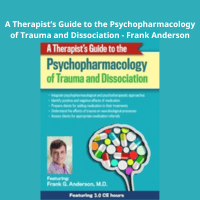Course Summary:
“A Therapist’s Guide to the Psychopharmacology of Trauma and Dissociation” by Frank Anderson is a vital resource for therapists seeking to understand the intricate relationship between trauma, dissociation, and psychotropic medications. This course aims to bridge the gap between psychotherapeutic approaches and the role of medication in treating individuals who have experienced trauma and/or present with dissociative symptoms or disorders. Frank Anderson, a renowned expert in the field, provides clear explanations of relevant psychopharmacological principles, common medications used, and how these intersect with therapeutic interventions. The course emphasizes a collaborative and informed approach to treatment planning, ensuring therapists can effectively communicate with prescribers and better support their clients’ holistic well-being.
Target Audience:
This program is specifically designed for:
- Therapists (psychologists, counselors, social workers, etc.)
- Mental health professionals
- Trainee therapists and interns
- Anyone working directly with individuals who have experienced trauma or dissociation and seeking a better understanding of psychopharmacological interventions.
Main Content:
The course likely covers key areas such as:
- Understanding the Neurobiology of Trauma and Dissociation: Exploring the brain mechanisms underlying trauma and dissociative processes and how medications can impact these systems.
- Common Classes of Psychotropic Medications: Providing an overview of different classes of medications used in mental health, including antidepressants, anti-anxiety medications, antipsychotics, and mood stabilizers.
- Medications Specifically Relevant to Trauma and Dissociation: Discussing the specific uses and considerations of medications in treating PTSD, complex trauma, and dissociative disorders.
- The Role of Medication in Symptom Management: Understanding how medication can help address specific symptoms associated with trauma and dissociation, such as anxiety, depression, hyperarousal, and intrusive thoughts.
- Collaboration Between Therapists and Prescribers: Emphasizing the importance of effective communication and collaboration for optimal client care.
- Psychoeducation for Clients: Providing guidance on how therapists can educate their clients about medication options and the potential benefits and side effects.
- Integrating Psychopharmacology with Psychotherapeutic Approaches: Exploring how medication can complement and enhance various therapy modalities.
- Potential Challenges and Considerations: Addressing issues such as medication side effects, adherence, and the complexities of polypharmacy in the context of trauma and dissociation.
- Case Studies and Practical Applications: Illustrating key concepts with real-world examples to enhance understanding and application.
Without the specific sale page link, this summary is based on the likely content of a course with this title and the expertise of Frank Anderson. If you can provide the sale page link, I can refine the summary further.
Enhance your understanding of psychopharmacology in treating trauma and dissociation!
SIGN UP NOW







